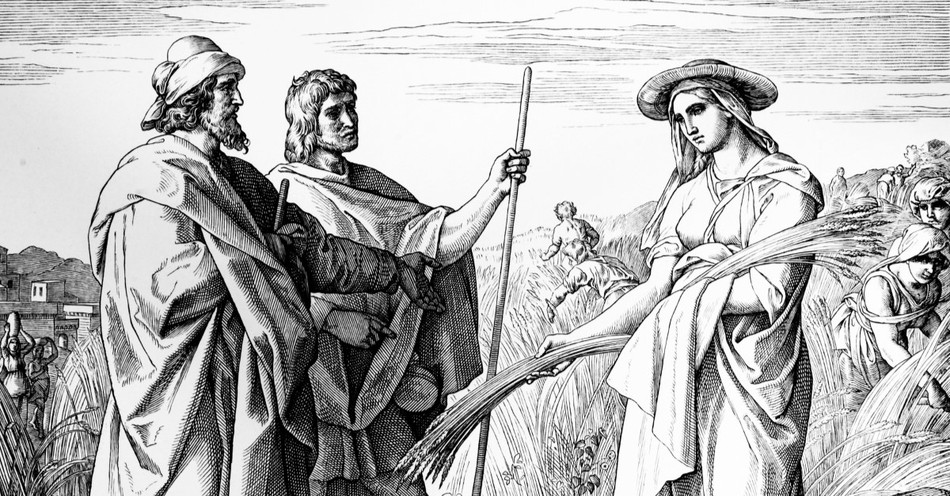The story of Boaz in the Bible is a fascinating tale that highlights themes of kindness, loyalty, and God's care. In the Book of Ruth, Boaz is a crucial character who owns much land in Bethlehem. He becomes essential because of how he treats Ruth, a woman from Moab who has lost her husband.
Tucked in the pages of the Old Testament is a tiny book about a woman named Naomi and her daughter-in-law, Ruth. Nestled among pages of oppression, wars, judges, prophets, and kings, the book of Ruth reads more like a romance novel. And the hero of the story? His name is Boaz, and his actions impacted the course of history and the lives of two very special women.
The opening line tells us the story takes place “in the days when the judges ruled in Israel" (Ruth 1:1, NLT). We know from the book of Judges that “in those days Israel had no king; all the people did whatever seemed right in their own eyes" (Judges 17:6). It was a time of chaos, and sin abounded. When a severe famine hit the land, Naomi’s husband Elimelech decided to move his family from Bethlehem to Moab, a land and people that had a long history with Israel—and not a good history.
Remember Balaam’s talking donkey? That story occurred when the king of Moab hired Balaam to curse God’s people, but instead, God had Balaam bless the Israelites three times. The Moabites became the enemy of Israel, yet this is where Elimelech decided to move his family.
While living in Moab, Elimelech died, and Naomi’s sons grew up. They married women from Moab, which God had commanded Israelites not to do. When Elimelech and Naomi’s sons died too, Naomi was left with her two daughters-in-law and no grandchildren. She decided to return to her people in Judah and urged her daughters-in-law to stay in Moab. One did, but one would not leave Naomi’s side. Ruth chose to follow both Naomi and her God. They returned to Bethlehem, where they found themselves alone and without resources. Enter our hero, Boaz.
Who was Boaz in the Bible?
Boaz is a prominent character in the Book of Ruth in the Bible. He is a wealthy landowner in Bethlehem and a relative of Naomi's deceased husband. Boaz is known for his generosity and adherence to the law, which is demonstrated by his kindness to Ruth, a Moabite widow and the daughter-in-law of Naomi.
When Ruth, in her loyalty to Naomi, follows her back to Bethlehem after the death of their husbands, she goes to glean in the fields during the barley harvest to support herself and Naomi. She ends up in the fields owned by Boaz, who notices her hard work and protects her. He offers her food and commands his workers to leave extra grain for her to collect.
Boaz's actions towards Ruth are governed by the Jewish laws of gleaning and levirate marriage, which dictate kindness to the poor and the provision for widows. Moved by Ruth's devotion to Naomi, Boaz marries her, securing her and Naomi's future. This union is significant as it places Ruth in the lineage of King David and, according to Christian tradition, in the genealogy of Jesus Christ.
How Was Boaz Related to Naomi?
The second chapter of Ruth begins by introducing readers to Boaz. He was a relative of Naomi’s husband, Elimelech, but he was also a wealthy and influential man in Bethlehem. In other words, he was a catch!
Ruth and Naomi arrived in Bethlehem at the beginning of the barley harvest. One day, Ruth asked Naomi if she could go to the fields and pick up any stalks of grain left behind. Naomi agreed, and Ruth found herself in a field that belonged to none other than our hero.
When Boaz arrived to check on the harvest being done in his field, he immediately noticed Ruth. He showed her incredible kindness, protected her, and blessed her with extra food for Naomi.
When Naomi found out that Boaz showed Ruth such kindness, she asked God to bless him and told Ruth, “He is showing his kindness to us as well as to your dead husband. That man is one of our closest relatives, one of our family redeemers. (Ruth 2:20)”
Why Was It Important for Boaz to Marry Ruth?
Naomi loved Ruth and wanted to know she would be well cared for. But she also wanted her family line to continue. She needed a son or grandson to care for her in her old age. This is why it was so important for Boaz to marry Ruth. All of this could be accomplished by one man, Boaz.
Ruth works in Boaz’s fields through the barley harvest and then through the wheat harvest. One evening, Naomi puts her plan into action by encouraging Ruth to get herself dolled up, sneak to Boaz’s threshing floor, and wait for him to fall asleep. Once he does, Ruth was to uncover his feet and lie down. When Boaz woke up and found her there, he knew what to do. He blessed Ruth, told her he would redeem her if possible, and sent her home with a gift of barley. After she left, he immediately went to the city gate to take care of business. There was a redeemer closer than him who legally had to be given a choice to redeem Ruth himself.
What Does It Mean that Boaz Was a Kinsman-Redeemer?
In her article “The Importance and Meaning of a Kinsman Redeemer,” Hope Bolinger writes, “a kinsman-redeemer is a male relative who helps a weaker relative in need or danger. But this goes beyond mere marriage proposals. This person avenges (in the case of a relative being murdered via manslaughter), delivers, rescues, and in many cases, redeems property. The role far extends beyond nuptial duties.”
As a kinsman-redeemer, Boaz could not only marry Ruth, but he could also buy back the land that once belonged to Elimelech. This is what Boaz presents to a man at the city gate, a man who is a closer relative than he. When the man says he will redeem the land, Boaz quickly speaks the words that change everything. “Of course, your purchase of the land from Naomi also requires that you marry Ruth, the Moabite widow. That way she can have children who will carry on her husband’s name and keep the land in the family.”
Just as Boaz expected (and dare I say, hoped), the man backed out of the deal. He told Boaz to redeem the land and Ruth since he did not want to endanger his own estate. You see, when a man redeemed the land, it wouldn’t entirely be his. It would stay tied to the lineage of the previous owner. And if the kinsman-redeemer and the woman he redeemed and married had a child, that child would carry on her dead husband’s name, not the redeemer’s name.
What Does the Bible Say about Boaz and Ruth’s Family?
So our hero Boaz gets to marry his Ruth, and they have a son. Naomi’s bitterness turns to joy, and she cares for the boy like her own son. This little boy’s name was Obed. Obed grew up and became Jesse’s father and David’s grandfather. That’s right, King David of the line of Jesus.
Boaz and Ruth are part of a notable family. Not just because Jesus Christ comes from their family line but because of who came before them. Ruth was a Moabitess, yet she chose God and was grafted into the family of God through her choice to follow Him and her marriage to Boaz. Boaz himself came from an interesting lineage. His father was Salmon, and his mother was Rahab. Rahab wasn’t an Israelite by birth, either. She was a prostitute who hid the spies that Joshua sent to scout out the land. When Israel attacked Jericho, they spared the lives of Rahab and her family because Rahab had helped them. Rahab then lived with the Israelites, chose to follow God, married Salmon, and gave birth to our hero, Boaz. What a family!
What Lessons Can We Learn from Boaz?
There is much we can learn from Boaz. Though he was a rich and influential man, he showed great kindness to Ruth. He offered her protection and helped provide for her and Naomi long before he took on her husband’s role. He did it because it was the right thing to do. He saw a need and was able to help, so he did. Boaz’s life teaches us that God will use people willing to be used by Him.
Boaz was also a man of humility. He redeemed the family land and married Ruth, knowing the land and their first child would not legally belong to him. His first son would not bear his name. There was no earthly reward for his actions, yet he did them because it was his duty as a kinsman-redeemer and the right thing to do. (I like to think he had also fallen in love with Ruth, but the text does not specifically state that.) Boaz teaches us to obey God’s Word and live humble lives that honor God, not ourselves.
I believe Boaz was prepared to love a foreign woman and graft her into his family and the greater family of Israel because he saw the example of his parents, Salmon and Rahab. He came from a family who knew how to do hard things and choose God over cultural expectations. Salmon and Rahab, Boaz and Ruth, King David, and eventually Joseph and Mary teach us that no matter where we come from, God can do great things through us if we choose to follow Him. God chose this precious family as the family line Jesus would be born into. Jesus, our Messiah, the greatest Kinsman-Redeemer of all. Will you choose to follow Jesus and join His family? He welcomes all who come to Him.
Photo Credit: Getty Images/gldburger

This article is part of our Bible resource for understanding the significance and meaning of biblical phrases and ideas. Here are our most popular Bible articles to grow in your knowledge of God's Word:
Promises of God in the Bible
Is "This Too Shall Pass" in the Bible?
What Was the Ark of the Covenant?
Top 10 Bible Stories for Kids
“Iron Sharpens Iron” in Proverbs 27:17
"Fearfully and Wonderfully Made" in Psalm 139
“Be Still and Know That I am God” in Psalm 46:10
"No Weapon Formed Against Me Shall Prosper" - Isaiah 54:17



